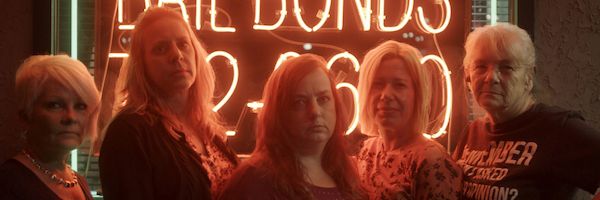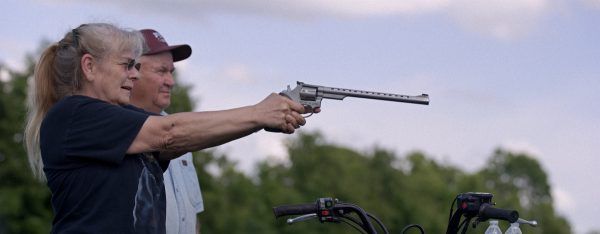[Editor's note: The following contains spoilers for Love Fraud.]
If you, like me, are a victim of abuse from a romantic partner, I would approach Love Fraud with caution. I say this not to overwhelm you with my own personal trauma at the start of a TV review, but as a fundamental piece of advice regarding what's fundamental to this show, for better and for worse. Love Fraud is as captivating, as gripping, as nail-bitingly watchable as any true crime series I've ever watched. It's made with impeccable filmmaking panache by two directors who obviously care deeply about the art form and their subjects. And it is constantly triggering throughout, melding stylish sequences of "revenge catharsis" with sparse depictions of truly horrifying human behavior in an icky, jagged combination — not to mention the slippery ethics of many decisions made by both the docuseries' subjects and filmmakers. I couldn't stop watching Love Fraud and I can't stop thinking about it now. But is that ultimately "good"?
There is a man, whom we can only consistently know as "Smith." Under various aliases, including Rick Smith, Scott Smith, Richard Scott Smith, and Mickey Smith, this man has a pattern. He finds a woman. Woos that woman. Tells her, quickly and aggressively, that he loves her, needs her, can't live without her. Often, marries her. He intertwines their finances together just as quickly and just as aggressively. And then, once all of her assets are acquired and spent by him, he's gone. Off to find a new mark, to repeat this manipulative pattern. His methodologies are so pervasive and so blunt that a collection of women have started a community-run website all about him to help warn others. But for some of his victims, that ain't enough. What will happen to Smith when a group of women bands together, alongside the help of several local bounty hunters and private detectives, to find Smith and take him down once and for all?
The directors of Love Fraud, Heidi Ewing and Rachel Grady (the duo behind the Oscar-nominated Jesus Camp), lens this journey with style, grace, grit, and a fascinating visual language. Presented in the more-cinematic aspect ratio of 2.4:1, the docuseries is communicated in ways both "caught" and "constructed." Ewing and Grady are fond of shooting their subjects' conversations dirty, with something bisecting the frame in the foreground even as we're focused on whoever's talking in the background. It gives a feel of "fly on the wall," yes, but also makes it feel like a prestige indie picture, as if I'm aware of Ewing and Grady's splendid visual eye in every frame. (Not to mention the fact that a key location's multi-colored neon lights make several scenes feel like Only God Forgives, one of the most formally rigorous crime films I've ever seen, yet a strange thing to compare a documentary to.)
The directors often play their subjects' interviews over static images, either of the subjects themselves doing nothing, or of whatever environment they're in; a hypnotic effect that ceaselessly caused me to sit forward and pay attention more closely. Surreal collage art often impedes the narrative, mimicking the psychological fracturing of all parties involved, causing goosebumps you could only get watching a horror movie as it communicates serious stories of trauma with J-horror-reminiscent images. As filmmakers, Ewing and Grady know what the hell they're doing, resulting in an effectively terrifying, strangely pleasurable watch throughout.
This intersection between "terrifying" and "pleasurable" is a consistently paradoxical, ethically squishy component to engaging with Love Fraud. It's an undoubtedly visceral joy to watch a group of scorned, fierce, justice-seeking women speak plainly about the pain they wish to cause Smith. It's also an undoubtedly visceral joy to watch main bounty hunter Carla Campbell — a woman who simply will not take anyone's shit — fuel and fan these flames. Ewing and Grady lean hard into this, putting our women in the center of their very own Quentin Tarantino sequences, underscoring their business with boot-stomping guitar licks, even staging obviously choreographed tableaus. There's even a dark sense of humor at the core of many memorable moments, both from the perspective of these women's musings on Smith and even from its depictions of Smith's behavior itself. It is captivating, cathartic, and ceaselessly attention-grabbing.
But when these folks' pain spill over into musings on (and steps taken toward) causing literal violence and bloodshed, suddenly the whole thing feels less "cool" — though you wouldn't be able to tell from Ewing and Grady's filmmaking. I thought to myself, several times while watching the series, "This is going to end with an onscreen murder." The subjects of the show, while rightfully pissed about the horrors Smith has put them through, have blood in their eyes, on their tongue, in their hands. Guns are a common tool in the world of Love Fraud which is, I suppose, just plain American. Seeing our bounty hunter Carla practice her aim on a range, laughing while she holds literally the longest pistol I've ever seen, is one thing. But lensing a sequence where one husband, whose wife left him for Smith's conniving charms, sits in his car, loads a gun, stuffs it in his pants, and walks out of the car like a damn '70s revenge thriller crosses a line.
I imagine this line is being crossed intentionally, in a sort of Michael Haneke-esque way ("You want revenge? I'll give you revenge, you sicko."), but any sense of intention is nulled by other filmmaking decisions throughout the film. At one point, we hear the off-screen voices of the directors insist to a private detective they should just do their job and act like they aren't there. But can we really believe our directors are interested in not affecting the story when they've used such manipulative language? When a previous on-screen chyron reads "We hired a private investigator," (the "we" clearly referring to the directors) aren't they, too, stoking the flames so they can keep their story going no matter what happens?
Amidst all of this paradoxical messiness, corruption, and claiming of authorial objectivity, Love Fraud uncovers a fundamental psychological truth not just about these subjects, but about America itself. Americans are constantly repressing pain and desire to get through the doldrums of life. We are fundamentally creatures of passion who learn that such passions only lead to unfulfilled dreams and desires. So we stuff, stuff, stuff them down. Then, along comes someone who promises to tap into these passions, who gives someone the promise of grand love they've been secretly yearning for all these years, who promises to fill that emptiness. Why wouldn't someone say yes? And why wouldn't this sudden disruption of what we're all supposed to do — repress our feelings to get by — result in the other way repressed feelings can explode? Violence almost starts to make sense as a response, both in reaction to this outside intrusion and in reaction to this outside intrusion being revealed as a bald-faced lie. America sincerely needs to work on being in touch with our feelings and how to healthily thread our desires into the tapestry of our obligations, or else we'll keep seeing folks resort to the things they resort to in this docuseries.
This piece of psychological uncovering is a welcome addition to Love Fraud. But one key piece of the four-episode puzzle, which occurs at the end, is about as unwelcome and unnecessary a feeling as I've had while watching any television show. For around 10 unbroken minutes, after nearly four hours of hearing the powerful voices of the oppressed, of the victimized, a platform is given to an oppressor, an aggressor. We stare the devil of this piece — Smith himself, talking to the directors from his prison cell — straight in the eye. Incredibly, he talks to us about why he actually isn't the villain he's made out to be. This sequence is given none of Ewing and Grady's previous stylizations, instead presented in more traditionally "unadorned" jump cuts of Smith's jabbering (on par with The Jinx subject Robert Durst), catalyzed by Ewing and Grady's offscreen voices. It's unsparing in detail.
And yet, I learned nothing from what is ostensibly the climax to Love Fraud. The language and tactics Smith uses hit on every red flag we've been taught to spot about an abusive partner. We know for a fact, since we saw it all happen before, that it's all a lie. We know for a fact, since we saw it all happen before, that Smith objectively did the things he says he objectively did not do. We know Smith is not the victim even as desperately pleads his victimhood. So, what are we learning? What do we gain from giving this oppressively evil figure so much time to speak? I suppose for folks who have not suffered abuse or trauma at the hands of someone like this, it could be an interesting psychological examination of such a monster, of such tactics, of such depths being sunk. But for those of us who have — and for those of us who are at least passingly familiar with sociopathic pathologies from, say, our President, whom Smith namechecks explicitly as being under a similar "witch hunt" during this sequence — what is the purpose of this troubling scene other than "to provide a docuseries a splashy ending"?
This sequence ended. The show ended not long after. I got up to refill my glass of water. Opened the fridge. Became paralyzed in anguish. Tears welled in my face as the cold of the fridge blasted my body. The voice of my Devil melted with the voice of the show's Devil, echoing and repeating and offering no relief. If a show is going to make me feel like this, if it's going to pick at the scars of traumas so bluntly, it needs to be for a damn good reason. Love Fraud has some damn good reasons, and some damn bad ones, too. It's the most watchable series I've ever watched that I'm not sure I can recommend watching.
Grade: B-
Love Fraud concludes its four-episode run on Showtime tonight, Sunday, September 20, at 9/8c.




